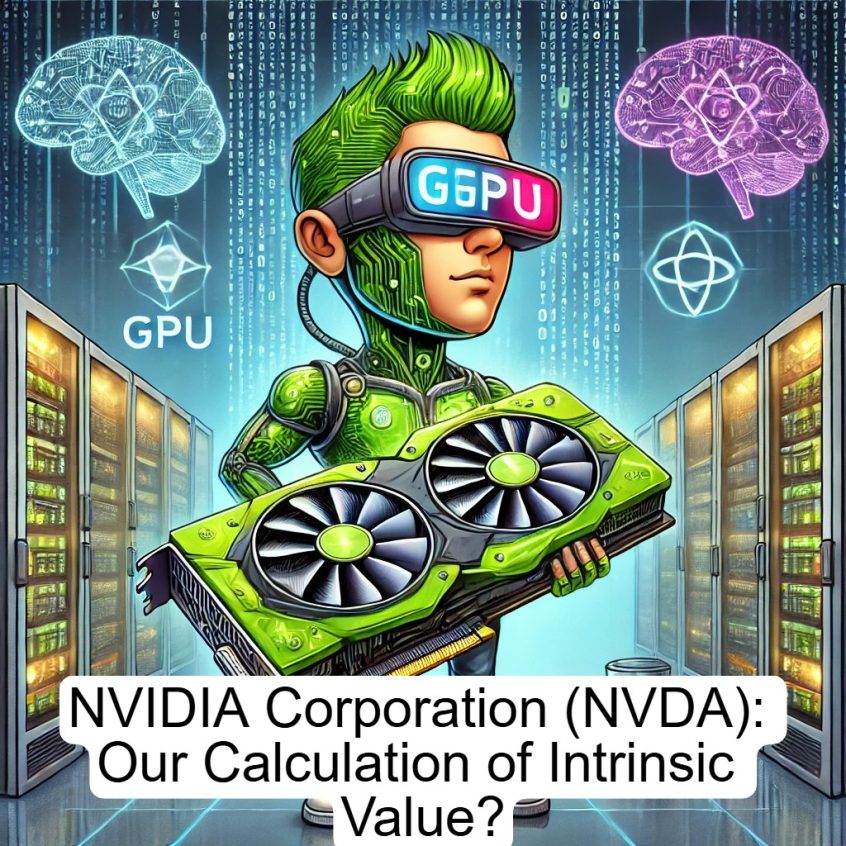As part of a new series, each week we typically conduct a DCF on one of the companies in our screens. This week we thought we’d take a look at one of the stocks not in our screens, NVIDIA Corporation (NVDA).
Profile
NVIDIA Corporation is a global leader in graphics processing units (GPUs), artificial intelligence (AI) infrastructure, and data center solutions. It operates in two primary segments: Graphics (45% of revenue) and Compute & Networking (55%), the latter of which powers the company’s rapid growth in AI, cloud computing, and autonomous vehicles. NVIDIA’s flagship products include the GeForce GPU lineup, the NVIDIA RTX platform, and its AI-centric NVIDIA H100 and Grace Hopper chips. The company has a dominant market share in gaming GPUs and has emerged as the leading provider of AI accelerator chips used by hyperscalers like Amazon, Microsoft, and Google.
Inputs
Discount Rate: 12%
Terminal Growth Rate: 4%
WACC: 12%
Forecasted Free Cash Flows (FCFs) in billions
| Year | FCF ($B) | Present Value ($B) |
|---|---|---|
| 2025 | 60.85 | 54.34 |
| 2026 | 66.94 | 53.40 |
| 2027 | 72.29 | 51.54 |
| 2028 | 76.63 | 48.73 |
| 2029 | 80.46 | 45.59 |
Total Present Value of FCFs = 253.60 billion
Terminal Value Calculation
Terminal Value = (FCF_2029 × (1 + g)) / (r – g)
= (80.46 × 1.04) / (0.12 – 0.04)
= 83.68 / 0.08
= 1,046.00 billion
Present Value of Terminal Value
PV of Terminal Value = Terminal Value / (1 + WACC)^5
= 1,046.00 / (1.12)^5
= 1,046.00 / 1.7623
= 593.58 billion
Enterprise Value Calculation
Enterprise Value = PV of FCFs + PV of Terminal Value
= 253.60 + 593.58
= 847.18 billion
Net Debt Calculation
Net Debt = Total Debt – Total Cash
= 10.27 – 43.21
= -32.94 billion (Net Cash Position)
Equity Value Calculation
Equity Value = Enterprise Value + Net Cash
= 847.18 + 32.94
= 880.12 billion
Per-Share DCF Value
Per-Share DCF Value = Equity Value / Shares Outstanding
= 880.12 / 24.4
= $36.07
Conclusion
| DCF Value | Current Price | Margin of Safety |
|---|---|---|
| $36.07 | $110.42 | -67.34% |
Based on the DCF valuation, NVIDIA appears overvalued. The estimated intrinsic value of $36.07 per share is significantly lower than the current market price of $110.42, resulting in a -67.34% Margin of Safety.
This suggests that while NVIDIA is a top-tier AI infrastructure provider, its current valuation still implies extremely optimistic assumptions well beyond our fundamental cash flow forecasts.
For all the latest news and podcasts, join our free newsletter here.
Don’t forget to check out our FREE Large Cap 1000 – Stock Screener, here at The Acquirer’s Multiple:




2 Comments on “NVIDIA Corporation (NVDA): Our Calculation of Intrinsic Value”
Here’s the revised version with your new line included:
⸻
Been following The Acquirer’s Multiple for a while now, but this DCF seriously makes me question your strategy and service. I say this with all due respect—but is this meant to be taken seriously?
You’ve projected NVDA’s intrinsic value at $36 per share, yet the model doesn’t even state a pre-terminal growth rate. It looks like your pre-terminal growth rate is only ~7% for five years?
From 2010 to 2022, NVIDIA grew free cash flow at a 25% CAGR—long before the current AI boom. That kind of consistent compounding doesn’t just vanish overnight. Why would you assume growth drops to low single digits next year with no explanation?
I’m not an accountant or CFA, but this is basic logic. If I’m missing something, I’d genuinely appreciate clarification.
Hey Todd.
Totally fair points—and I appreciate the respectful pushback.
To clarify, in my DCF I used a 12% discount rate (equal to WACC), a 4% terminal growth rate, and a conservative ~7% FCF growth for 5 years. The intent wasn’t to predict NVIDIA’s actual trajectory, but to stress-test valuation under more cautious assumptions.
NVIDIA’s historical 25%+ FCF growth is undeniable, but given its current size, AI hype premium, and macro uncertainty, I chose to dial expectations down to avoid overfitting to the past.
That said, I agree this should have been better explained.